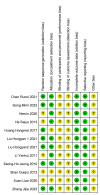Efficacy and safety of allogeneic platelet-rich plasma in chronic wound treatment: a meta-analysis of randomized controlled trials
- PMID: 39448627
- PMCID: PMC11502684
- DOI: 10.1038/s41598-024-75090-0
Efficacy and safety of allogeneic platelet-rich plasma in chronic wound treatment: a meta-analysis of randomized controlled trials
Abstract
Allogeneic platelet-rich plasma (al-PRP) is gaining attention in clinical practice for treating chronic refractory wounds, though research results remain controversial. To assess the clinical efficacy of al-PRP for chronic refractory wounds. Databases including PubMed, Cochrane Library, Embase, CNKI, SinoMed, VIP, and WFPD were searched for randomized controlled trials comparing al-PRP with conventional treatments up to October 2023. Two researchers independently screened studies, extracted data, and assessed quality. Statistical analysis was conducted using RevMan 5.4, and potential publication bias was assessed and corrected using funnel plots and Egger's test. Twelve studies with 717 cases were included. Meta-analysis showed al-PRP significantly improved outcomes compared to non-al-PRP treatments: increased healing rate (RR 2.72, 95% CI 1.77-4.19, p < 0.00001), shortened healing time (SMD - 1.03, 95% CI -1.31 to -0.75, p < 0.00001), improved efficacy rate (RR 1.19, 95% CI 1.10-1.28, p < 0.00001), increased wound shrinkage (MD 35.65%, 95% CI 21.65-49.64, p < 0.00001), and reduced hospital stays (MD -2.62, 95% CI -4.35 to -0.90, p = 0.003). Al-PRP is a feasible, effective, and safe biological therapy for chronic refractory wounds.Trial registration: PROSPERO Identifier CRD42022374920.
Keywords: Allogeneic; Chronic refractory wounds; Clinical effect; Meta-analysis; Platelet-rich plasma; Ulcers.
© 2024. The Author(s).
Conflict of interest statement
The authors declare no competing interests.
Figures










Similar articles
-
Autologous platelet-rich plasma for treating chronic wounds.Cochrane Database Syst Rev. 2012 Oct 17;10:CD006899. doi: 10.1002/14651858.CD006899.pub2. Cochrane Database Syst Rev. 2012. Update in: Cochrane Database Syst Rev. 2016 May 25;(5):CD006899. doi: 10.1002/14651858.CD006899.pub3 PMID: 23076929 Updated. Review.
-
Autologous platelet-rich plasma for treating chronic wounds.Cochrane Database Syst Rev. 2016 May 25;2016(5):CD006899. doi: 10.1002/14651858.CD006899.pub3. Cochrane Database Syst Rev. 2016. PMID: 27223580 Free PMC article. Review.
-
Effect of platelet-rich plasma in treating patients with burn wounds: A meta-analysis.Int Wound J. 2024 Mar;21(3):e14486. doi: 10.1111/iwj.14486. Epub 2023 Nov 6. Int Wound J. 2024. Retraction in: Int Wound J. 2024 Aug;21(8):e70018. doi: 10.1111/iwj.70018 PMID: 37931602 Free PMC article. Retracted.
-
Clinical Studies on Platelet-Rich Plasma Therapy for Chronic Cutaneous Ulcers: A Systematic Review and Meta-Analysis of Randomized Controlled Trials.Adv Wound Care (New Rochelle). 2022 Feb;11(2):56-69. doi: 10.1089/wound.2020.1186. Epub 2021 Jun 8. Adv Wound Care (New Rochelle). 2022. PMID: 33607926 Free PMC article.
-
Allogeneic Platelet-Rich Plasma Therapy as an Effective and Safe Adjuvant Method for Chronic Wounds.J Surg Res. 2020 Feb;246:284-291. doi: 10.1016/j.jss.2019.09.019. Epub 2019 Oct 14. J Surg Res. 2020. PMID: 31622885 Clinical Trial.
References
-
- Yuan, X. et al. Guideline for the diagnosis and treatment of chronic refractory wounds in orthopedic trauma patients (version 2023). Chin. J. Trauma39(06), 481–493 (2023).
-
- Dissemond, J. et al. Efficacy of MMP-inhibiting wound dressings in the treatment of chronic wounds: A systematic review. J. Wound Care29(2), 102–118 (2020). - PubMed
-
- Lu, S. L. Enhance the connotation of establishment of wound healing department. Zhonghua Shao Shang Za Zhi28(1), 1–2 (2012). - PubMed
-
- Frykberg, R. G. et al. Chronic wounds treated with a physiologically relevant concentration of platelet-rich plasma gel: A prospective case series. Ostomy Wound Manag.56(6), 36–44 (2010). - PubMed
Publication types
MeSH terms
Grants and funding
- 82072169/the Program of National Natural Science Foundation of China
- 82272279/the Program of National Natural Science Foundation of China
- 82072169/the Program of National Natural Science Foundation of China
- 82272279/the Program of National Natural Science Foundation of China
- 82072169/the Program of National Natural Science Foundation of China
- 82272279/the Program of National Natural Science Foundation of China
- 82072169/the Program of National Natural Science Foundation of China
- 82272279/the Program of National Natural Science Foundation of China
- 82072169/the Program of National Natural Science Foundation of China
- 82272279/the Program of National Natural Science Foundation of China
- 82072169/the Program of National Natural Science Foundation of China
- 82272279/the Program of National Natural Science Foundation of China
LinkOut - more resources
Full Text Sources
Research Materials

